

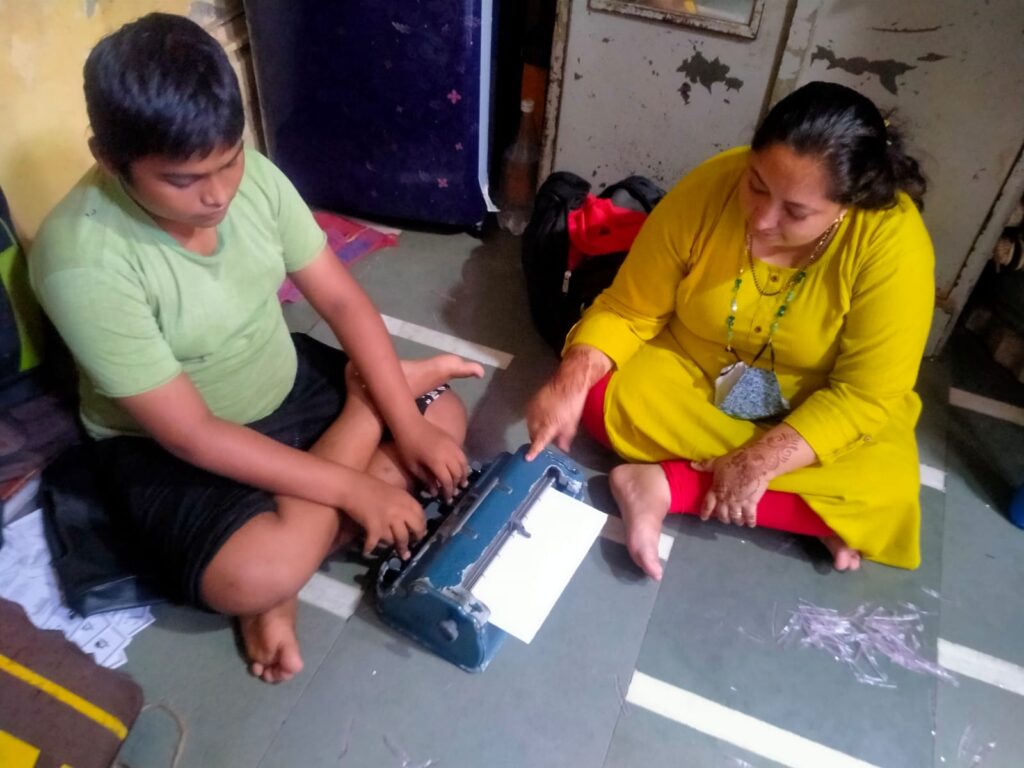
Education
Background
The first special school for the visually impaired in India was set up at Amritsar in 1887. During the subsequent six decades several special schools came up in different parts of the country. As a result, there were about 50 such schools at the time of attaining independence. Visually impaired children for the most part stayed in these institutions and received education along with some elementary trades that later led them to vocational rehabilitation. However, not much was achieved through this system of education, in so far as their socio-economic rehabilitation was concerned. There were other concerns too – isolation from mainstream, standard of education and expensive nature of the system.
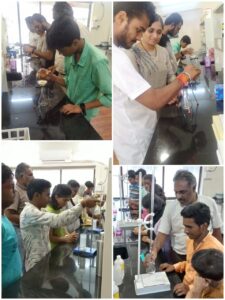
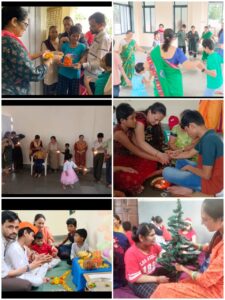
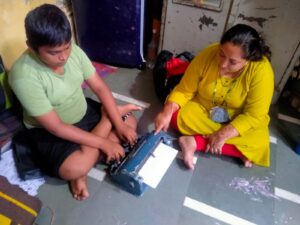


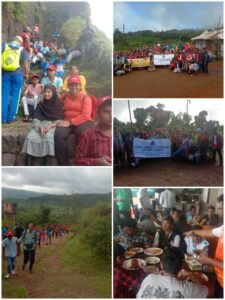
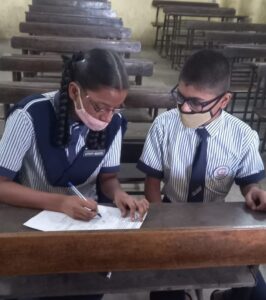

New Beginnings
In 1958, Mrs. Rehmut Sultan Fazelbhoy, a trained teacher of the visually impaired and a member of the Executive Council of NAB (India) was successful in admitting three visually impaired boys in New Activity School in Mumbai, of which Mrs. DolatDungaji was the Principal. Such efforts, however, remained isolated to a few cases in the 60s and 70s. Thereafter, what started as an experiment in Mumbai gained rapid grounds in a decade’s time, and in the years that followed became a movement that spread in the other parts of the country.
In the intervening period, NAB (India) provided school and college going visually impaired children support services in the form of scholarships, free distribution of braillers and other assistive devices, volunteer reading services and so on.
History
Realizing that a visually impaired child too – like any other child – deserves education, NAB (India), set up its Education Committee in 1961, which efficiently handled the general problems related to education of the visually impaired and contributed a great deal to introduction of the Integrated Education (IE) system. This vital activity received impetus when NAB (India) appointed Mr. M. K. Choudhary as its first Education Officer in 1980, and subsequently established a full-fledged department – the NAB Department of Education – to handle this task. Later on, Mr. Anand S Athalekar, the then Director of NAB Department of Education and present Hon. Secretary General, NAB India put his efforts in strengthening the department especially the Integrated Education Program at national level. Being an educationist, Mr. Anand Athalekar, wrote many books towards the education of visually impaired in mainstream education. In the last five years, the department has offered its services to more than 12,000 visually impaired beneficiaries.
Activities
Integrated Education (IE)
Partnering with local voluntary organizations – especially in the rural areas – the Department has so far initiated education of more than 10,000 visually challenged children through “Itinerant Teacher Model” of IE, wherein visually impaired children reside with their families and attend the nearest regular schools. They receive the services of a special educator called itinerant teacher, who attends to the following tasks:
1. Teaching Extended Core Curriculum that is Braille, use of special arithmetic and geometric devices, orientation & mobility, activities of daily living, orientation and training on usage of access technology through laptop, computer, tablets, smartphone and Braille Me – Advanced Braille device, etc.
2. Preparing/procuring instructional materials like Braille/large print text-books, tactile maps, diagrams etc.
3. Family counselling.
4. Serving as a link between the child and the school authorities and providing guidance on classroom management, remedial teaching for subjects like Mathematics and Science, peer tutoring and evaluation.
5. Community Resource Mobilisation – arranging for readers, scribes, transcribers, private tutors, etc.
The Department presently supports 64 IE units, catering to more than 800 visually impaired children all over the country, with a budgetary outlay of about Rs.2,00,00,000/-. The cost of education of one visually impaired child is Rs. 25,000/- per year.
Free distribution of Braille Kits
Every visually impaired child irrespective of whether he/she is studying in special school or IE program must have access to a braille kit. A Braille kit contains basic educational devices needed by visually impaired students for learning braille, arithmetic, geometry, etc. The cost of a Braille kit is Rs.1,785/- (Including 5% GST). The Department distributes about 500 braille kits every year to schools for the visually impaired and IE implementing agencies in India, with an expenditure of about Rs.8,92,500/-. So far, over 18,000 braille kits have been distributed. In this direction, the department has received support from our well-wishers such as Royal Commonwealth Society for the Blind, UK; Jinendra Foundation, UK; Blind Foundation of India, USA; Amway Opportunity Foundation; Rotary Foundation’s matching grant project; Super Hits Red FM 93.5; Give Foundation; General Insurance Corporation of India; SBI Life Insurance Company Ltd., etc.
Free distribution of Braillers
Depending on availability of earmarked donations, braillers are distributed to institutions as well to the visually impaired students pursing higher education. The cost of a brailler is Rs.52,500/- including 5% GST (around $600 to $650). So far, about 500braillers have been distributed to the deserving visually impaired individuals and institutions.
Home-based programme for Multi-Disabled Visually Impaired (MDVI) children
The additional disabilities MDVI children possess along with visual impairment are mentallychallenged, hearing impairment, autism, hyper activity, cerebral palsy etc. Itinerant teachers train these children in developmental areas like motor skills, communication, sensory skills, concept formation, activities of daily living, orientation and mobility, functional academics, pre-vocational skills, social skills, community-based instructions etc. Parents’ meetings, picnics, outings, social gatherings, festival celebrations, camps etc., are a regular feature in this program. Cost of education of one MDVI child is Rs.25,000/- per year.The same program is run by the department through its like-minded partner agencies at four to five different locations in the country at national level.
Human Resource Development Programmes
Primarily aimed at community participation in IE Programs, the Department conducts short-term training programs for parents, volunteers, itinerant and regular teachers, throughout India. Integrated Camps are also organized at various locations to provide visually impaired and sighted children the opportunity to come together and learn from each other. Similarly, special skills enrichment camps for visually challenged children are organized during vacations, to give them rigorous and intensive training in Extended Core curriculum. The yearly expense on conducting these programs at various locations is around Rs.5 lakh.
NAB HINCOL Science Laboratory
NAB with the support of Hindustan Colas Private Limited (HINCOL) under their CSR initiative set up the Science Laboratory in Head Office premises of NAB India. The Science Laboratory was set up with the aim to enhance the interest of the visually impaired students in the abstract subject like science with maximum exposure towardsscience practical. It is one of the well-equipped Science labs for visually impaired in the country set up by NAB India.
Training Centre for Teachers of the Visual Impairment (TCTVI)
Started in 2000, TCTVI offers two-year Diploma in Special Education (Visual Impairment), which is affiliated to the Rehabilitation Council of India (RCI), Government statutory body.From September – 2021 onwards the Training Centre for Teachers of the Visually Handicapped (TCTVH) is being addressed as Training Centre for Teachers of the Visual Impairment (TCTVI) on the instructions of Rehabilitation Council of India, New Delhi (RCI).The National Institute for the Empowerment of persons with Visual Disabilities (Divyangjan) formerly known as NIVH, Deharadun conducts the exam in four semesters. The eligibility Criteria is Std.XII passed. The course medium of instruction is Marathi, Hindi and English. Needy trainees are provided lodging and boarding facilities at a reasonable cost. We are proud to say, almost all the candidates who have so far passed out from TCTVI are either employed in Special Schools or Integrated/Inclusive Education Programs in the State of Maharashtraand other states in the country.TCTVI received a Certificate of Excellence from RCI in 2005.This year TCTVI has received an extension in approval for 5 years from 2021-2022 to 2025-26 with the intake of admission with 35 students per batch.
Consultative Services
Professional staff of the Department participates in various seminars, workshops, training programs etc., in consultative capacity. Many of them serve on important committees of the Government of India and other vital policy-making bodies.
Sale of Aids and Equipment
The Department stocks basic assistive devices used by the visually challenged in education, mobility, recreation etc. These items purchased from various manufacturers are made available to individuals and organizations, on no profit no loss basis. Devices worth Rs.20 to 30 lakh are sold each year.
In Conclusion
There is not a single aspect concerning education of the visually impaired that NAB (India) hasn’t touched. In fact, many of the prevailing practices in the fields of other disabilities have their origins in the ideas generated by NAB (India), in the sphere of education of the visually impaired. Our mission is to ensure that every visually impaired or low vision child has access to formal education in an appropriate environment and is provided all the support services necessary for academic excellence and all-round development.
Way to Support Us
There are various ways to support the education of visually impaired or multi disabled visually impaired children such as –
1. To support the education of one visually impaired child with Rs.25,000/-.
2. To support the Integrated Education Programme with maximum number of students.
3. Donation for free distribution of Braille Kits to visually impaired students.
4. By donating grocery for the residential TCTVI students
5. To support the education of one MDVI child with Rs.25,000/-
6. To support the Home-Based Programme for Multiply Disabled Visually Impaired students with maximum numbers.
7. Support for the educational devices to the needy & deserving visually impaired students such as – voice recorders, Laptops, brailler, etc.
8. Support for assistive devices for the Multiple disabled visually impaired students with special modified chair for Cerebral Palsy children, therapy balls, sensory toys and mats, splints (as per requirement), etc.
9. Support towards the requirement of dormitorythings.
Contact Information:
Pradnya Upadhye, Director.
Mobile –9375766301. Landline: 022-2493 5365. Extn: 230/250 & 262.
Committee: Department of Education & Louis Braille Memorial Research Centre and Publications Committee (LBMRC)– 2022-26
Chair Person – Dr Sujata Bhan
Honorary Secretary In-Charge – Shri Anand S Athalekar (Hon. Sec. General)
Members: 1. Dr. Vimal Kumar Dengla (Hon. Secretary, NAB India)
2. Dr.Preeti Verma
3. Ms SampadaShevde
4. Mrs Archana Joshi
5. Mrs Dipti Gandhi
6. Mrs Nishat Imam
7. Mr Pankaj Vishwakarma
8. Mr Kayamuddin Khan
9. Ms Pradnya Upadhye – Convener